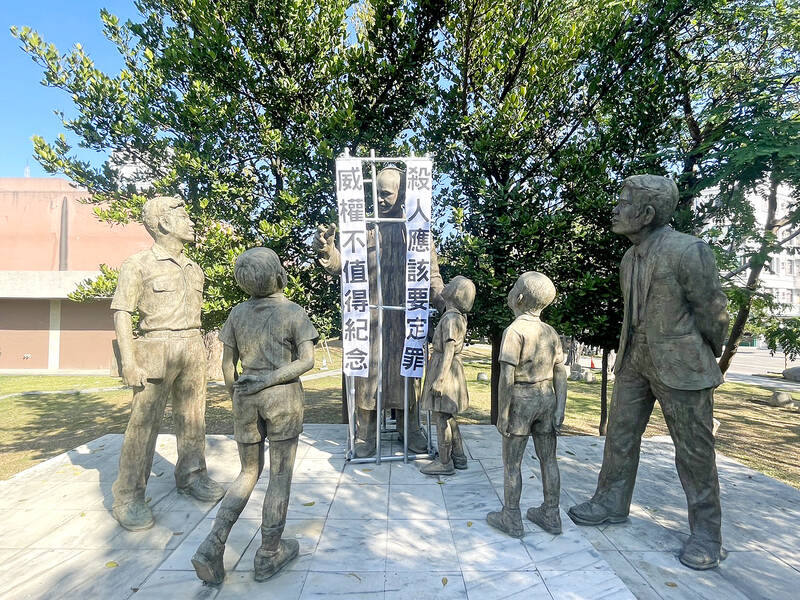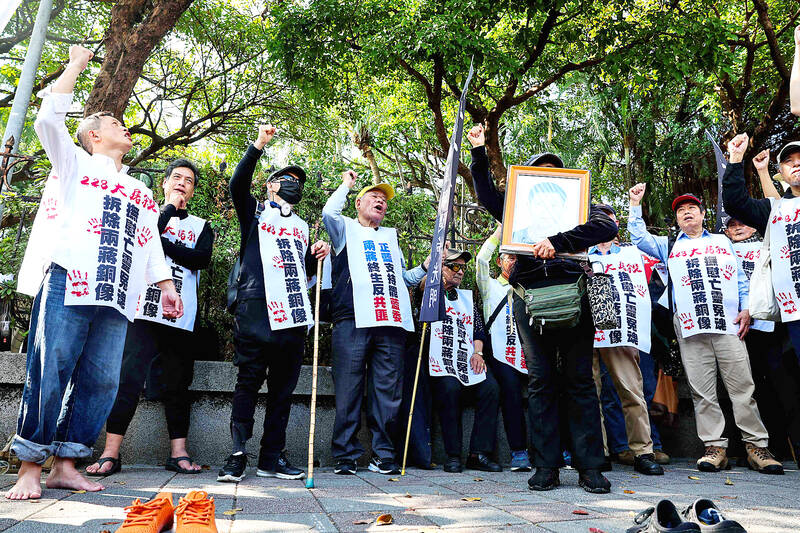Protesters yesterday put a cage around a statue of Chiang Kai-shek (蔣介石) in Tainan to symbolize their commitment to holding the former Chinese Nationalist Party (KMT) leader responsible for the 228 Incident.
Taiwan Statebuilding Party Tainan branch director Jill Wu (吳依潔) said that members of the party put the iron cage around the statue outside the Tainan Cultural Center in East District (東區) to symbolically lock him in prison for his crimes.
The statue is part of an installation whose Chinese-language name (承先啟後) means “to inherit the past and inspire the future.”

Photo coutesy of the Taiwan Statebuilding Party’s Tainan branch
The protester draped two banners over the cage that read: “People should not worship authoritarian regimes” and “Mass killings must be prosecuted.”
Wu said that the Tainan City Government had not followed through with transitional justice for the 228 Incident.
The Incident refers to a series of protests sparked by police actions as they confiscated contraband cigarettes from a woman in Taipei on Feb. 27, 1947.

Photo: Cheng I-hwa, AFP
According to the Memorial Foundation of 228, the woman who sold the illegal cigarettes was badly injured by the police, igniting a public outcry that had been building against the rule of the then-authoritarian KMT regime.
The protests quickly spread across Taiwan for several days, leading to violent and fatal crackdowns by the government, the foundation’s Web site says.
People in Tainan played major roles in Taiwan’s democracy movement, but many city roads and public spaces still have monuments to the dictatorship, Wu said.
“Locking Chiang in an iron cage is our artistic expression to represent the hopes of Taiwanese,” she said. “We urge the city government to remove symbols of authoritarianism to achieve transitional justice and not persist in worshipping the KMT dictator.”
Ceremonies were held across Taiwan to commemorate the 78th anniversary of the 228 Incident.
Taipei Mayor Chiang Wan-an (蔣萬安) and former president Ma Ying-jeou (馬英九) attended the Taipei City Government’s event at 228 Peace Memorial Park in Zhongzheng District (中正).
At an event in Taichung, Greater Taichung 228 Memorial Association chairwoman Liao Ling-hui (廖苓惠) said that the massacre of 1947 must not happen again.
The KMT has never learned from its history “and still want to cooperate with the Chinese Communist Party,” Liao said.
The KMT and the Taiwan People’s Party are colluding with China, she accused, urging them “not to sell out Taiwan.”
KMT Chairman Eric Chu (朱立倫) wrote on social media that the KMT would deeply reflect on the past and has the courage to take on this responsibility.
He also called for the Democratic Progressive Party to forgo politics and listen to the public, as history and memories should prompt reflection and unity, not hatred and confrontation.
Additional reporting by Wang Jung-hsiang

CHANGING LANDSCAPE: Many of the part-time programs for educators were no longer needed, as many teachers obtain a graduate degree before joining the workforce, experts said Taiwanese universities this year canceled 86 programs, Ministry of Education data showed, with educators attributing the closures to the nation’s low birthrate as well as shifting trends. Fifty-three of the shuttered programs were part-time postgraduate degree programs, about 62 percent of the total, the most in the past five years, the data showed. National Taiwan Normal University (NTNU) discontinued the most part-time master’s programs, at 16: chemistry, life science, earth science, physics, fine arts, music, special education, health promotion and health education, educational psychology and counseling, education, design, Chinese as a second language, library and information sciences, mechatronics engineering, history, physical education

The High Prosecutors’ Office yesterday withdrew an appeal against the acquittal of a former bank manager 22 years after his death, marking Taiwan’s first instance of prosecutors rendering posthumous justice to a wrongfully convicted defendant. Chu Ching-en (諸慶恩) — formerly a manager at the Taipei branch of BNP Paribas — was in 1999 accused by Weng Mao-chung (翁茂鍾), then-president of Chia Her Industrial Co, of forging a request for a fixed deposit of US$10 million by I-Hwa Industrial Co, a subsidiary of Chia Her, which was used as collateral. Chu was ruled not guilty in the first trial, but was found guilty

DEADLOCK: As the commission is unable to forum a quorum to review license renewal applications, the channel operators are not at fault and can air past their license date The National Communications Commission (NCC) yesterday said that the Public Television Service (PTS) and 36 other television and radio broadcasters could continue airing, despite the commission’s inability to meet a quorum to review their license renewal applications. The licenses of PTS and the other channels are set to expire between this month and June. The National Communications Commission Organization Act (國家通訊傳播委員會組織法) stipulates that the commission must meet the mandated quorum of four to hold a valid meeting. The seven-member commission currently has only three commissioners. “We have informed the channel operators of the progress we have made in reviewing their license renewal applications, and

Taiwan-based publisher Li Yanhe (李延賀) has been sentenced to three years in prison, fined 50,000 yuan (US$6,890) in personal assets and deprived political rights for one year for “inciting secession” in China, China's Taiwan Affairs Office spokesman Chen Binhua (陳斌華) said today. The Shanghai First Intermediate People’s Court announced the verdict on Feb. 17, Chen said. The trial was conducted lawfully, and in an open and fair manner, he said, adding that the verdict has since come into legal effect. The defendant reportedly admitted guilt and would appeal within the statutory appeal period, he said, adding that the defendant and his family have